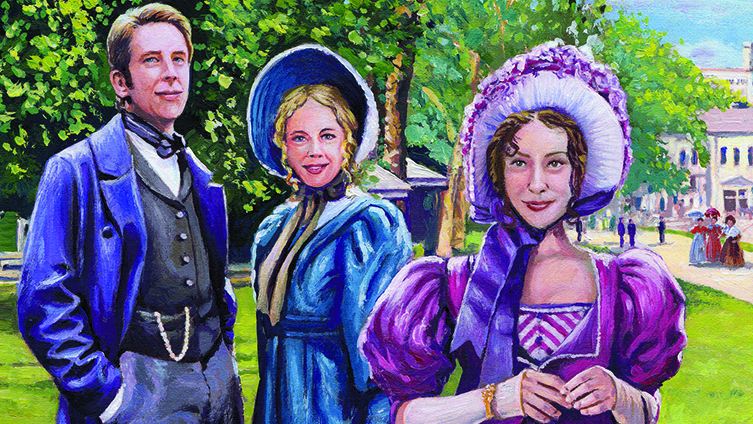On Distant Shores – Episode 03

On Distant Shores
« Previous Post- 1. On Distant Shores
- 2. On Distant Shores – Episode 01
- 3. On Distant Shores – Episode 02
- 4. On Distant Shores – Episode 03
- 5. On Distant Shores – Episode 04
- 6. On Distant Shores – Episode 05
- 7. On Distant Shores – Episode 06
Isabel Moore straightened some books as the afternoon sunshine slanted across the floor of the First School.
She glanced around the room with its worn desks and primers, knowing there was no reason to stay in the shabby schoolhouse on North Square, mere blocks away from Boston’s notorious Murder District.
Yet while her pupils fought off the despair of their poverty, Isabel battled a despair of her own: the staid, predictable life of a labelled spinster and bluestocking.
Compared to her pupils, Isabel knew, she had little to complain about. Yet the thought of returning home to the stuffy confines of her parents’ house on Beacon Hill made her spirit start to wilt. She envisioned the dinner that Cook would have prepared – boiled ham, pigeon pie and potatoes, followed by Washington cake or gingerbread and cream, all delicious and yet so predictable, and accompanied by the equally predictable conversation between her and her parents as they all struggled to cover the awkwardness of having a thirty-year-old daughter, unmarried and without any prospects, living at home.
It seemed incredible to think she’d once been the belle of Boston society, poised to marry an up and coming doctor. Oh, the dreams she’d cherished! She’d envisioned herself as Ian Crombie’s wife, hoped to elevate him into society, to stand by his side, as Caroline Campbell – now Crombie – was doing.
Despite his love for Caroline, Ian had behaved like a gentleman and offered to marry Isabel. Society had expected it; they’d appeared together so many times, although Ian had seen those pleasant evenings as time spent with an affectionate little sister, nothing more.
When he realised the error he’d made, he’d proposed, but it was an offer Isabel would not accept. She did not want a proposal made out of pity, and she wouldn’t relegate herself to such an unhappy role as the wife of a man who married out of duty, not love.
Isabel knew it had been the right choice, and in the last five years she’d thrown herself into the First School, teaching and organising the classroom, drawing the pupils close to her heart. The other two teachers had left for more domestic pursuits.
Most of the time Isabel could ignore the pangs she felt when she saw couples in society, or when she sat against the wall with the matrons at a tea dance or ball. She reminded herself of how blessed she was to be intelligent and independent, with a calling as high as that of wife and mother.
It was only in these moments, when the day had been difficult and she felt very alone, that the old ache came back and she had to keep herself from wallowing in bitterness and self-pity.
“Ready, miss?”
Isabel looked up to see her brother Henry’s man, Caber, standing at the door. He was there as a safety measure, for the streets around North Square were not safe for a woman alone. John Caber was well over six feet tall, and built like a mountain.
Even with Caber’s protection, Isabel knew her family was not always comfortable with having her spending her days with the denizens and dregs of Boston. It was only because of Margaret having started the school as a pet charity project that she was able to teach here.
“Yes, John. Thank you.”
Turning from the empty room, Isabel gathered her mantle and bonnet and headed with Caber into the chilly afternoon. The sun was beginning its descent behind the worn brick buildings of the square, and already the streets were emptying, a cool breeze from the harbour bringing with it the sharp tang of brine and fish. In the hurrying crowds Isabel caught fragments of the Irish brogue that had become common in the North End as ship after immigrant ship poured hundreds of desperate souls into the city.
Lost in her thoughts, with Caber like a dark shadow at her elbow, Isabel almost bumped into the man handing out tracts in front of the Seaman’s Bethel.
“Good afternoon, Miss Moore!” Edward Taylor’s voice was deep and melodious, only one of the reasons his vigorous sermons had earned him the title of finest orator in all of Boston. Yet Taylor was not a man of circumstance or stature; his work was amongst the poorest and roughest, here in the North End, where he’d started his seamen’s mission 10 years ago.
He smiled and thrust a tract at Isabel, who had no choice but to accepted the printed pamphlet with surprised grace.
“Adoniram Judson is back in America, after thirty-three years in Burma,” he said in that powerful voice that made Isabel straighten her spine. “An inspiring man, and a wonderful preacher. He’s speaking at the Bowdoin Street Church this Tuesday. You would consider yourself most blessed to hear of his labours, Miss Moore.”
“I’m sure I would.” Isabel smiled faintly, the pamphlet still clutched in her gloved fist. “Thank you for availing me of such an opportunity, Father Taylor. Good day to you.”
She stuffed the pamphlet in her reticule and, urged on by Caber, mounted the carriage.













